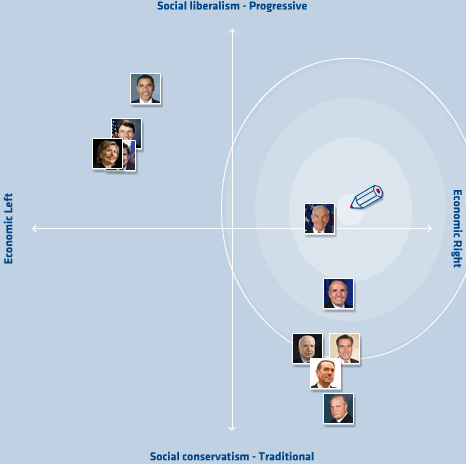Ron Paul’s My Guy!
 The latest quiz meme going around the blogosphere is the Electoral Compass USA, which asks 36 rather poorly worded survey questions on a wide variety of issues and then matches you up with the candidates. Amusingly, Ron Paul is far and away the closest to me.
The latest quiz meme going around the blogosphere is the Electoral Compass USA, which asks 36 rather poorly worded survey questions on a wide variety of issues and then matches you up with the candidates. Amusingly, Ron Paul is far and away the closest to me.
Dan Drezner had the same outcome, much to his chagrin. He rationalizes the finding away thusly:
This, by the way, is why things like personality and leadership style are relevant to voting decisions (and are tough to capture in surveys). A candidate’s policy positions are not the only thing that matter. The way in which the candidate will try to implement these policies matters too. I would’nt vote for a candidate who shared my precise policy positions but decided to implement them by constitutionally questionable methods, for example. Process matters just as much as substance.
Steve Bainbridge, whose results paired him with Mitt Romney — his least favorite candidate — concurs.
Mostly, though, I think this just shows that these political compass surveys don’t work very well. For one thing, as Drezner notes, they don’t measure intensity — they simply treat all issues equally, regardless of how important they are to a particular voter.
More importantly, though, the questions don’t allow for nuanced answers. In this particular case, the survey is filled with double barreled questions that presume premises with which I disagree.
“People should have a background check and obtain a license before they can buy a gun,” I answered Yes to this because it makes sense to take prudent measures to keep guns away from felons and nutcases. But I’d only support relatively painless “instant” background checks.
At the same time, I agree that “Stricter gun control will not reduce crime.” This question, though, points to another problem with the survey: Negative questions. They should all be in the form of “Stricter gun control will reduce crime.” Introducing a negative and then asking people to agree/disagree is confusing.
“An additional carbon tax on fuel will effectively reduce pollution” presumes a rather specific degree on knowledge which most people simply lack. Whether they understand the science behind it is irrelevant in measuring ideology, I suppose, but I’d wager few people even understand what a carbon tax is.
“The US should never sign international treaties on climate change that limit economic growth” merges two issues in a dubious way.
“The US had every right to invade Iraq” is a legal question rather than an ideological one. But it’s pretty complicated, regardless. One who says, “Yes, because Iraq violated the terms of the Gulf War cease fire treaty and several UN Security Council resolutions” is displaying very different ideological beliefs than someone who says, “We’re the United States of America and can invade whomever we goddamn well please!”
“The US is safer because of the invasion of Iraq.” I’d say we’re not in the short term but might be in the longer term. Regardless, we need to keep trying to buy time for an effective government to stabilize. Where does that fit on the quadrant/candidate map?
“The best way to reduce the federal deficit is to raise taxes.” The best way is stunning economic growth, followed by spending restraint. But tax cuts are good, too. So, while I disagree fundamentally with Dennis Kucinich on this question, we’d give the same answer.
“The government has no responsibility to provide retirement funds.” There’s so such inherent responsibility. We’ve created one, however, by seven decades of forced contributions to Social Security. So, do I agree with Ron Paul? Hillary Clinton?
“The federal government should reduce income inequality.” I’m a right-libertarian but would say Yes if No is my only alternative. At a minimum, we need to provide a safety net for those who truly can’t work owing to illness or handicap.
“Iran is not an imminent threat to world peace” is a ridiculously complicated question. It’s certainly a dangerous country led by a rogue regime. But it’s largely a regional threat and I’m not sure it’s “imminent.”
“The US should decrease its spending on defense” is something I’ve argued for years. It doesn’t make sense right this minute, though, given that we’re deployed to two major wars.
There are probably a dozen or more such examples but I shan’t belabor the point any longer.






I doubt they’re poorly worded, per se’. I rather think they were worded so as to get the desired result… the one you report to us.
That was kind of a long post to establish a proposition that I strongly doubt anyone disagrees with.
I mean is there anybody out there who though online political surveys were more rigorous and meaningful than the “what kind of kisser are you” kind?
I was shattered when I took the “Which superhero are you” quiz, and it didn’t actually give me superpowers!
This is the most unusual think I have seen in a long time. How far are we going to go to explain away right from wrong, and important from unimportant. Personality? Style? It’s like People magazine syndrome.
Substance is substance, right is right, wrong is wrong, integrity is integrity. Style and personality are the two lowest traits anyone should seek in a candidate.
Here is how the two extremes would play out.
1) Substance guy – He lacks charm and flare. He works on implementing courageous and important progress but sells it poorly. He is fought and the going is rough. Only if he could word things better, only if he could soften resistance. He continues and even the though tough, it is found that the POLICY and the MESSAGE sell themselves. So after much repeating the ideas take hold despite the messenger’s shortcomings. They take root and the dwindling spiral is reversed.
2) Personality guy – He has horrible ideas but sells them really well. People believe him and they go for what he offers. Things begin to decay and eventually crumble. Style guy continues to explain away the most flagrant mistakes and problems. People still buy it because he is their guy. However, when it starts to really get bad some shout violent “revolt”. But others keeping a cool head shout “revolt of ideas”. They overturn personality guy and refocus on core human issues.
As opinion leaders to those who read your pieces you need to look at your responsibility.
What are your values? How much forward thinking do you do? How will these candidates and issues bear out within the next few years? Yes, if you change your mind you may not be invited to certain barbeques anymore but you will have the satisfaction of endeavoring to do something valuable. This is a prize far greater than anything money can buy.
I think this is a Dutch quiz. (Hey Bit you know those Dutch love RP.) They did more or less the same thing for the Dutch political parties before the last election here, but there were more questions and they were more specific. Translation issues could have complicated the wording.
As for issue weight the survey allows you to either opt out of a question partially with a neutral response or completely either by answering no opinion or unchecking the issue box at the end of the survey.
No, the failure in quizzes like this is that they only really have the politician’s own public statements to work from – meaning that they assume said pol actually believes and/or would actually do the things he says. Hell, I’m surprised everyone doesn’t get matched to Romney by that count…
I think what this survey shows is that James and many others among us would fall pretty close to an unnamed, mainstream realistic libertarian. In this test, Ron Paul is pretty much placed into that category, with the exception of immigration and abortion where he is off the reservation. But the quiz doesn’t capture who Ron Paul actually seems to be. If it had lots of questions about the gold standard, eliminating public schools, and some thick red meat from of the Ron Paul newsletter paranoia variety, Ron Paul would be somewhere off the chart. That leaves James, me, and many other Americans stuck looking longingly as we fall into the big empty space between Obama and McRomney (let’s toss the Guiliani result along with Paul, he’s just nuts) wishing that we could one day actually get some candidates that fall in the spot where the chart mistakenly puts Ron Paul: someone who is socially liberal and economically conservative. I’m open to the argument that McCain is there and just doesn’t show up that way because of the necessary pandering to win the GOP nomination.
Interesting that Obama shows up as furthest to the right of the Dems on the economic axis. So if someone just as conservative on the economic line as RP but more liberal that James on social issues, this program would tell them they are closest to Obama. I guess that is the revelation that came to Andrew Sullivan.
And notice how Huckabee doesn’t show up in the bottom left quad like Club for Growth says he would.
Is Fred Thompson really at the very bottom of the chart or did he just fall there after dozing off?
I just went over the quiz in both languages with my wife and there were really only 2 major translation issues.
Q 23 asks if illegal aliens should be given the right to citizenship in english whereas in Dutch it asks if they should be given the possibility of citizenship.
Q27 asks if the government should insure those w/o medical insurance whereas the Dutch version asks if the gov should insure they get insurance.
Both of these make a substantive difference and I would guess that the test is graded on the Dutch version.
The previous incarnation of this quiz for Dutch politics (stemwijzer) allowed you to weight the issues. This option was likely left out here due to lack of similar familiarity with the American politicians and issues.
http://www.glassbooth.org
Glass Booth is the answer to the common gripe that these compass quizzes assign the same value to each issue. With GB, you start with 20 points and award as many as you like to a number of different issues, so that it’s possible to tell it that you just don’t care about issue X by giving it a zero.
As for accuracy…well, sorta.
bgodley:
Substance guy needs to get a whole team of personality guys running his campaign.
The internet may be valuing substance more and more, but the majority of voters are still plugged into the TV.
What about the license? Should the government have a database of weapons and who owns them, or require that citizens get approval before buying a weapon? I like how it works in Florida: background check, 3 day waiting period (unless you have a concealed carry permit — which is MUST-ISSUE unless you’re criminal, alcoholic, violent, retarded, etc), but no record of who owns which weapon is given to the government. That’s actually in the state constitution, I believe. Specifically talks about how weapon lists can be used by the government for tyrannical reasons.
But lumping “background check” with “licensed” does make for a muddled question, yeah.
As is usual with tests of this sort, I, basically, hit the bullseye. I scored nearly in the center of both axes, just slightly to the right.
That’s as good an explanation for why I’m dissatisfied with all of the presidential aspirants as any.
Yeah, you’re screwed. 🙂
Contributors to this quiz:
Netwerk: a Dutch government-funded left-wing TV show. Free University amsterdam: a left-wing university. “coolpolitics”: some lame Dutch initiative that wants to make politics “cool” for Dutch youth (win more left-wing votes). De Volkskrant, a socialist newspaper.
They all seem like very trustworthy people to make a quiz on American politics.
I’m close to Ron Paul myself, according to the test. It gives me the strong feeling that the test designers made assumptions about people who answered certain ways. Such as being a creationist God annoying racist if you support the war in Iraq. So once again we see how prejudice ruins an idea once again.
The electoral compass is just to get a starting point. After you’ve finished the questionnaire you can click on the issues (and see how the respective positions of the politicians change in the picture when you take certain issues out of the equation).
You can also click on the picture of the candidate and compare their positions with yours, how much agreement there is, and why they rank the candidate as having that positions. The latter includes links to transcripts of debates, webpage, interviews, etc.
The idea behind an electoral compass is that it is a starting point, that you can inform yourself about candidates and issues in the most convenient way.